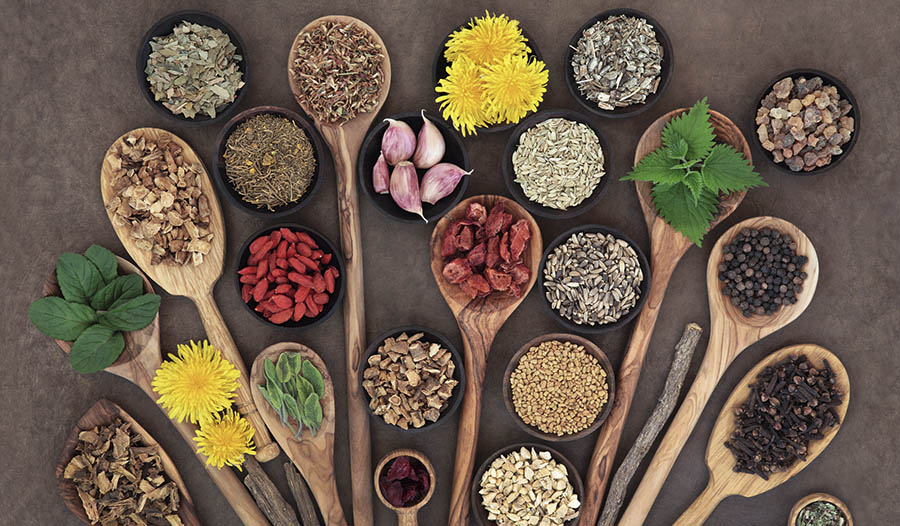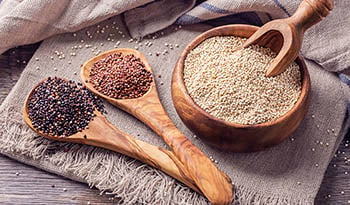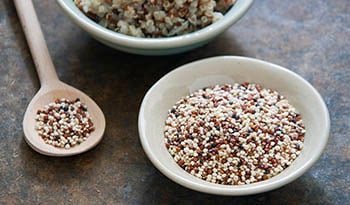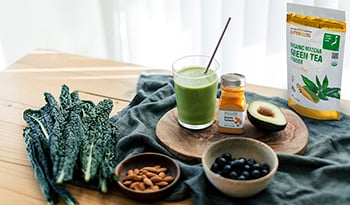Top Superfoods Packed With Antioxidants
DISCLAIMER:This blog does not intend to provide diagnosis...
- In this article:
- Wheatgrass (Triticum aestivum)
- Goji Berries (Lycium barbarum or Lycium ruthenicum)
- Cinnamon
- Acai Berries (Euterpe oleracea)
- Maqui Berry (Aristotelia chilensis)
- Bee Propolis
- Spirulina
- Other Superfoods

Superfoods are a group of foods rich in vitamins, minerals, and plant-based nutrients with antioxidant properties called phytonutrients. Corporate food companies have gone to great lengths to create and market foods that have little to no nutritional value, what we usually refer to as “junk food”. The products are created by food scientists and designed to be addicting, and it's worked—many people in the United States and a growing number of countries around the world are eating processed foods, which increases the risk for many diseases.
Ideally, one should focus on eating a diet full of fruits and vegetables. Adding superfoods is part of the equation and can help you on your journey towards health and happiness.
Wheatgrass (Triticum aestivum)
Wheatgrass, which comes from the wheat plant, is a superfood rich in phytonutrients. Able to be cultivated indoors or outdoors, it grows in the United States and Europe. Wheatgrass is rich in vitamins, minerals, and antioxidants and can be used as a snack or meal replacement when consumed as a powder.
Wheatgrass is rich in:
- Vitamin A
- Vitamin C
- Vitamin K
- Selenium
- Magnesium
- Antioxidants such as phenolic acid and chlorophyll
Benefits of wheatgrass
- Promotes detoxification in the liver by supporting the phase I and phase II pathway
- Helps optimize immunity
- Helps alkalize the body
- Helps lower cholesterol levels
- Higher antioxidant properties than most other vegetables
Wheatgrass is available in capsules and powder or as a liquid. Directions: Take as directed on the label.
Goji Berries (Lycium barbarum or Lycium ruthenicum)
Goji berries contain potent antioxidants. They are rich in phenolic acids, tannins, flavonoids, anthocyanins, and certain vitamins. Native to Asia, where they're commonly consumed, goji berries contain vitamins A and C, iron, and potassium—they are a great addition if your goal is to improve health.
Benefits of goji berries:
- Anti-aging properties
- Antioxidant properties
- Help protect the brain from Alzheimer’s disease
- Increases stamina, according to practitioners of Traditional Chinese Medicine
- Helpful for those with diabetes
- Lowers cholesterol
- Help keep retina eye cells healthy
Goji berries can be taken as a supplement, as a dried berry fruit, applied topically on the skin, or consumed as a juice.
Directions: take as directed on the label.
Cinnamon
Cinnamon is one of the most used spices, derived from a unique tree bark. It is used in traditional medicine, including Ayurvedic medicine, and by many cultures. The spice can be added to coffee, oatmeal, rice, and many other foods. It's been shown to have many health benefits.
Benefits of cinnamon:
- Lowers blood sugar in those with diabetes
- Anti-inflammatory properties
- Antibacterial properties, including activity against MRSA (also known as Methicillin Resistant Staphylococcus Aureus)
- Antioxidant properties
- Liver protection
A 2017 study showed it may be helpful in the prevention of Alzheimer’s disease.
- Reduces fasting insulin in women with polycystic ovarian syndrome
- Reduces LDL (bad) cholesterol
- Reduces total cholesterol
Cinnamon is available as a supplement and as a cooking spice and essential oil.
Directions: Take or use as directed on the label.
Acai Berries (Euterpe oleracea)
The acai berry comes from the Amazon region of South America, where it has been consumed for hundreds of years by indigenous cultures as both a food and drink. This powerful fruit, rich in polyphenols and antioxidants, has become increasingly popular worldwide over the last decade.
Studies have demonstrated many health benefits of Acai:
- Weight Management
- Anti-inflammatory properties
- Protects the heart
- Helps improve circulation by dilating blood vessels
- Antidiabetic properties
- Helps lower cholesterol
- Antioxidant properties
- May help prevent Alzheimer’s disease, according to a 2013 study (by inhibiting beta-amyloid deposits in the brain, the cause of Alzheimer’s)
Acai berry is available in both supplements and powder form.
Directions: Take as directed on the label.
Maqui Berry (Aristotelia chilensis)
Maqui Berry is a deep purple fruit that grows wild in the southern parts of Chile. It is harvested for commercial use by the Mapuche Indians and has powerful antioxidant properties. Its ability to protect against oxidation comes from its high content of phenolic acids, flavonoids, and anthocyanins—specifically delphinidins, the strongest antioxidants of all anthocyanins. A 2017 study in Food & Function demonstrated that maqui berry when consumed with a high-fiber diet, maintained high-level antioxidant capacity.
Maqui berry has the following:
- Anti-inflammatory properties inhibit COX-2, according to a 2017 study. This is the same enzyme that pharmaceutical drugs such as celecoxib (Celebrex) target.
- Antioxidant properties
- Promotes vascular health through the production of nitric oxide
- Reduce vascular inflammation according to a 2015 study
- Promotes the growth of beneficial bacteria in the gut, according to a study in the International Journal of Molecular Sciences
- A 2016 study concluded that Maqui berry helps improve blood sugar (glucose) levels in those with prediabetes
- Anti-aging properties, when applied topically
Maqui berries can be consumed as a supplement or as a powder, which can be consumed directly or added to a fruit smoothie.
Directions: Use as directed on the label
Bee Propolis
It’s commonly known that bees make honey—some may also be familiar with royal jelly, a common supplement made from a secretion that worker bees produce. However, few know that bees also make propolis, a substance made by extracting specific ingredients from plants, beeswax, and flowers. Propolis is also known as “bee glue”.
Propolis comes from the Greek words pro, which means “at the entrance to,” and polis, which translates to “community” or “city”. Propolis is the glue used to keep a beehive together, and it has many substances within it. Cardol and quercetin are two of many active ingredients found in bee propolis—these substances help provide its medicinal benefits.
The Incas of South America used propolis to fight fevers, while the Greeks and Romans used it to heal wounds.
Health benefits of bee propolis:
- Lower blood sugar levels in diabetics, according to a 2017 study in the Journal of Integrative Medicine
- Protection against diabetic kidney disease has been demonstrated using animal models
- Antibacterial and antifungal properties
- Antioxidant properties
- Protects the liver from mercury toxicity
- May protect against dental cavities
- A 1995 study showed a reduction in upper respiratory infections in children
- Lowers total cholesterol levels in those with diabetes
- Killed melanoma cancer cells in a laboratory study
- Killed colon cancer cells in a laboratory study in 2017
While a few studies have shown bee propolis may be active against certain types of cancer cells, no human studies have been done to show any anti-cancer benefit.
Bee Propolis can be taken in supplement form, as an oral spray, or topically on wounds to help prevent infection.
Directions: Take as directed on the label
Spirulina
Spirulina is an easily digestible nutritional supplement, which belongs to a family of blue-green algae and can be taken in a pill or powder form. Spirulina comes from a type of bacteria scientists call cyanobacterium, specifically arthrospira platensis. Learn more about spirulina.
Spirulina contains a complete source of protein, vitamins, minerals, and phytonutrients.
Benefits of Spirulina:
- Anti-inflammatory properties
- May reduce arthritis-related pain
- Antioxidant properties
- Lowers cholesterol levels
- Lowers blood sugar in those with diabetes and prediabetes
- Good source of zinc, which is important for skin health, a strong immune system, and memory
- Good source of B vitamins, which are important for nerve, brain, and heart health. Since those who consume a vegetarian diet tend to lack vitamin B12, daily supplementation with spirulina can provide up to 60 percent of the recommended daily allowance (RDA) requirement for vitamin B12.
- Contains gamma-linolenic acid (GLA), an essential fatty acid found in vegetables. It’s considered a healthy omega-6 oil and has anti-inflammatory benefits.
Adding spirulina to the diet is a good place to start for those attempting to maximize their nutritional intake. Spirulina can be taken in supplement form or as a powder, added to foods or a fruit smoothie.
Other Superfoods
- Almonds
- Cacao/Cocoa Powder
- Chia Seeds
- Garlic
- Hemp Seeds
- Kale
- Spinach
- Seaweed
References:
- Mini Rev Med Chem. 2015;15(12):1002-10 (Wheatgrass has anti-cancer properties)
- Phytother Res. 2006 Mar;20(3):218-27. (Wheatgrass has high antioxidant properties)
- Islam T, Yu X, Badwal TS, Xu B. Comparative studies on phenolic profiles, antioxidant capacities and carotenoid contents of red goji berry (Lycium barbarum) and black goji berry (Lycium ruthenicum). Chemistry Central Journal. 2017;11:59. doi:10.1186/s13065-017-0287-z.
- Exp Gerontol. 2005 Aug-Sep;40(8-9):716-27 (Goji berries help protect brain from AD)
- Pol. J. Food Nutr. Sci., 2016, Vol. 66, No. 2, pp. 67–75 DOI: 10.1515/pjfns-2015-0040 http://journal.pan.olsztyn.pl
- Mandal S, Deb Mandal M, Saha K, Pal NK: In vitro antibacterial activity of three Indian spices against methicillin- resistant staphylococcus aureus. Oman Med J 2011, 26:319–323
- Ranasinghe P, Pigera S, Premakumara GS, Galappaththy P, Constantine GR, Katulanda P. Medicinal properties of “true” cinnamon (Cinnamomum zeylanicum): a systematic review. BMC Complementary and Alternative Medicine. 2013;13:275. doi:10.1186/1472-6882-13-275.
- Pharmacol Res. 2017 Dec 16. pii: S1043-6618(17)31165-9. doi: 10.1016/j.phrs.2017.12.011. [Epub ahead of print] (Cinnamon may be helpful in preventing Alzheimer’s disease)
- Hajimonfarednejad M, Nimrouzi M, Heydari M, Zarshenas MM, Raee MJ, Jahromi BN. Insulin resistance improvement by cinnamon powder in polycystic ovary syndrome: A randomized double-blind placebo controlled clinical trial. Phytotherapy Research. 2017;1–8. https://doi.org/10.1002/ptr.5970
- BMC Complement Altern Med. 2017 Dec 28;17(1):550. doi: 10.1186/s12906-017-2067-7.
- J Cardiovasc Pharmacol. 2016 Jul;68(1):19-26. doi: 10.1097/FJC.0000000000000347. (Heart benefits of Acai berry)
- Food Chem. 2015 Jul 15;179:137-51. doi: 10.1016/j.foodchem.2015.01.055. Epub 2015 Feb 4.
- J Med Food. 2017 Sep;20(9):830-837. doi: 10.1089/jmf.2017.0027. Epub 2017 Jul 21.
- Neurosci Lett. 2013 Nov 27;556:221-6. doi: 10.1016/j.neulet.2013.10.027. Epub 2013 Oct 22.
- Food Funct. 2017 Dec 21. doi: 10.1039/c7fo01671a. [Epub ahead of print]
- Food Chem Toxicol. 2017 Oct;108(Pt B):438-450. doi: 10.1016/j.fct.2016.12.036. Epub 2016 Dec 28.
- Minerva Cardioangiol. 2015 Apr;63(2 Suppl 1):1-12.
- Overall J, Bonney SA, Wilson M, et al. Metabolic Effects of Berries with Structurally Diverse Anthocyanins. Mateus N, ed. International Journal of Molecular Sciences. 2017;18(2):422. doi:10.3390/ijms18020422.
- Alvarado JL, Leschot A, Olivera-Nappa Á, et al. Delphinidin-Rich Maqui Berry Extract (Delphinol®) Lowers Fasting and Postprandial Glycemia and Insulinemia in Prediabetic Individuals during Oral Glucose Tolerance Tests. BioMed Research International. 2016;2016:9070537. doi:10.1155/2016/9070537.
- Wagh VD. Propolis: A Wonder Bees Product and Its Pharmacological Potentials. Advances in Pharmacological Sciences. 2013;2013:308249. doi:10.1155/2013/308249.
- Journal of Integrative Medicine. 2017 Mar;15(2):124-134. doi: 10.1016/S2095-4964(17)60315-7.
- Pak J Pharm Sci. 2009 Apr;22(2):205-10. (Protects against Diabetic Nephropathy)
- Indian J Exp Biol. 2009 Apr;47(4):264-9. (Liver protection from mercury)
- Wagh VD. Propolis: A Wonder Bees Product and Its Pharmacological Potentials. Advances in Pharmacological Sciences. 2013;2013:308249. doi:10.1155/2013/308249.
- Rom J Virol. 1995 Jul-Dec;46(3-4):115-33. (Bee Propolis could help prevent upper respiratory infections in children)
- J Pharm Biomed Anal. 2018 Feb 5;149:502-511. doi: 10.1016/j.jpba.2017.11.038. Epub 2017 Nov 12.
- Kustiawan PM, Lirdprapamongkol K, Palaga T, et al. Molecular mechanism of cardol, isolated from Trigona incisa stingless bee propolis, induced apoptosis in the SW620 human colorectal cancer cell line. BMC Pharmacology & Toxicology. 2017;18:32. doi:10.1186/s40360-017-0139-4.

 By Dr. Eric Madrid, M.D.
By Dr. Eric Madrid, M.D.


